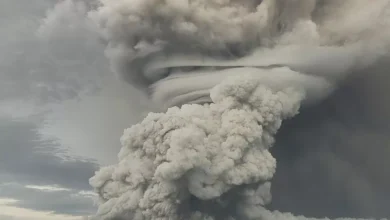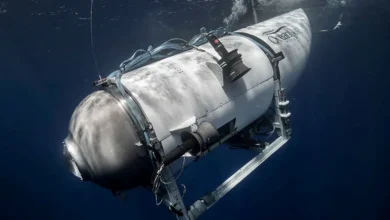We stopped nuclear weapons spreading. Is it time to the same with fossil fuels?
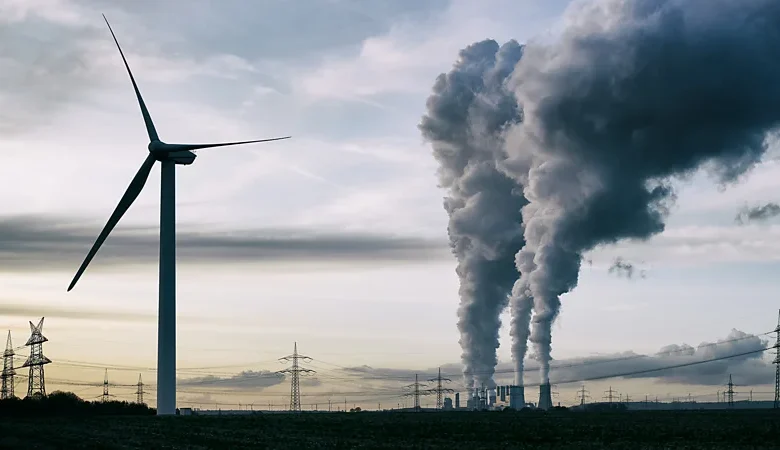
The fear of nuclear war forced nations to come together to stop the spread of atomic weapons. As the world confronts the reality of climate change, could a similar idea curb the use of fossil fuels?
Could we agree to stop using fossil fuels like we did nukes?
In 1958, at the height of the Cold War, Ireland’s minister for external affairs Frank Aiken gave a powerful speech at the UN General Assembly in New York. He asked the question: “How can the course of history be turned away from death and towards life?”
Aiken told world leaders that he believed the “growing destructiveness of modern weapons”, particularly nuclear ones, demanded a legal solution and called for global negotiations to prevent their spread.
Three years later, the Cuban Missile Crisis between the US and the Soviet Union put the world perilously close to a full-blown nuclear war. But intensive diplomacy by Aiken and others meant that by 1961 the UN had unanimously agreed that the proliferation of nuclear weapons was an urgent problem that had to be addressed.
The work of building a legal agreement had begun and in 1970 the Treaty on the Non-Proliferation of Nuclear Weapons (commonly known as the Nuclear Non-Proliferation Treaty or NPT) entered into force. A total of 191 states joined the treaty, including the five biggest holders of nuclear weapons: the US, USSR, UK, France and China. These five agreed not to give nuclear weapons to any another state and not to encourage others to develop them.
Humanity is now at another precarious point, teetering close to a rise of 1.5C in average global temperatures, which risks huge changes to human health and lives. In 2023, another Irish leader, former president Mary Robinson, warned that the world faced an “existential threat”; that year was confirmed as the hottest on record. This year is likely to be also.
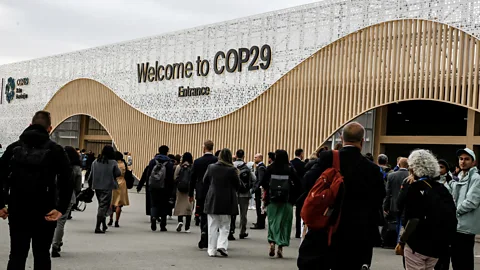
But as world leaders and their diplomatic teams gather in Baku, Azerbaijan this week for COP29, nearly three decades of negotiations under the United Nations Framework Convention on Climate Change (UNFCCC) have not succeeded in halting the emission of greenhouse gases.
A key issue – the exploitation of fossil fuels that have caused the vast majority of human emissions – is still only a small part of the discussion.
There is no mention of fossil fuels in the main text of the landmark Paris Agreement, which was finalised in 2015. It was not until last year’s climate talks that nations took explicit aimat them, agreeing at last to “transition away” from coal, oil and gas. That fell far short of the phase out that many countries had hoped for, and even the weaker pledge has been downplayed by some governments as “optional”.
Fergus Green, associate professor in political science at University College London, says this is the result of a deliberate strategy, primarily by large fossil fuel producers, to focus on greenhouse gas emissions rather than where they come from. The fossil fuel industry, which helped sow climate denial, has long been accused of influencing the talks through heavy lobbying. This year is no different; a secret recording at COP29 appears to show a senior official discussing potential fossil fuel deals.
The Fossil Fuel Non-Proliferation Treaty, as it has become known, is modelled on its nuclear cousin
There is still a huge disconnect between what governments are saying and doing. Recent and upcoming COP hosts Azerbaijan, United Arab Emirates and Brazil are all planning major expansions in fossil fuels, according to research by the NGO Oil Change International. Even if the world is on an “unstoppable” shift towards renewable energy, the International Energy Agency says the global phase down of fossil fuels is not happening quickly enough.
To try to address this, a growing coalition of governments, academics, lawyers and activists is pushing for a new global treaty to tackle the supply of fossil fuels head on.
The idea was born at the Pacific Islands Development Forum, where Pacific Island leaders initially called for “a new global dialogue” on a moratorium on fossil fuels. In 2016, island leaders met to discuss a new treaty that “could form a new source of international law”. The concept was reinvigorated three years later by a journal article written by researchers Peter Newell and Andrew Simms of the University of Sussex in the UK.
The Fossil Fuel Non-Proliferation Treaty, as it has become known, is modelled on its nuclear cousin. It seeks to end new exploration and production of coal, oil and gas, phase out existing stockpiles, speed up the transfer of clean energy technology to poorer nations, enable a just transition for workers and communities, and help countries still dependent on fossil fuels diversify their economies.
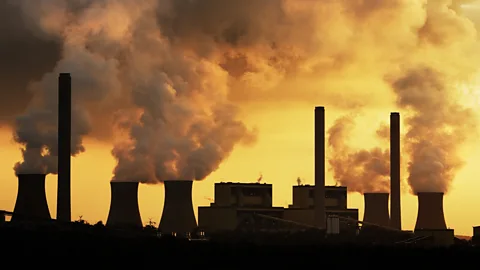
“When we first launched, there was an impression that we don’t believe in [the Paris Agreement], we don’t believe in the UNFCCC,” says Amiera Sawas, head of research and policy at the Fossil Fuel Non-Proliferation Treaty Initiative.
“But that’s not true. We just realise that it’s taken 28 years to get fossil fuels into the text. We have a limited carbon budget, limited time to deliver and, although there is progress, we can’t deny that certain goals are being missed,” says Sawas.
She refers in particular to national pledges to cut greenhouse gas emissions that still fall well short of what is needed to keep average warming under 1.5C and have been criticised for excessive reliance on technologies that do not yet exist at scale. Many poorer countries are also wary of a long-promised $100bn (£77.3bn) in annual climate finance that the OECD says was finally delivered in 2022, but relies heavily on loans and “relabelled” aid.
Getting the right buy-in from states would be essential to passing and enforcing such a treaty on fossil fuels
Susi Snyder, programme coordinator at the International Campaign to Abolish Nuclear Weapons (Ican), believes a fossil fuel treaty could play an important role in shifting the political and legal landscape on climate change. But she thinks it should be modelled less on the NPT and more on a successor agreement called the Treaty on the Prohibition of Nuclear Weapons (TPNW).
Snyder says progress under the NPT had stalled by 2010, with governments pledging to take nuclear weapons out of their policies but in reality “doing the opposite”. The TPNW, which states went on to negotiate, entered into force in 2021, completely prohibiting nuclear weapons among its members. It already has half the UN on board.
Jochen von Bernstorff, professor of constitutional and public international law and Human Rights at the University of Tübingen in Germany, says a fossil fuel treaty could be the latest in a line of “rebellious” treaties that seek to build on earlier multilateral agreements, but also challenge and further them. Other examples include the International Treaty on Plant Genetic Resources for Food and Agriculture and a World Health Organization pandemic treaty that is currently being negotiated.
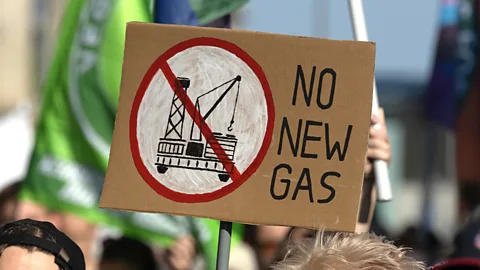
Bernstorff describes these treaties as a “creative response” to a stalemate caused by “powerful states defending the legal and political status quo”.
Getting the right buy-in from states would be essential to passing and enforcing such a treaty on fossil fuels.
The initiative has hundreds of endorsements from cities, sub-national governments and Indigenous nations, from Vancouver in Canada to the Awajún people in Peru. It also has support from the World Health Organization, the European Parliament and the Vatican, and thousands of scientists and academics.
However, only a handful of states have explicitly said they will support it. These are largely island nations that are highly vulnerable to climate change but are very small greenhouse gas emitters. One notable exception is Colombia, which was the first major fossil fuel producer to endorse the idea in December 2023.
The message we’re hearing is that, largely, they want to phase out fossil fuels – Amiera Sawas
A threshold of around 50 states would be needed to make such a treaty work, suggests Von Bernstorff. “If you have more than 50, other states take it seriously, other institutions take it seriously – especially if it keeps on growing.” He notes that two nuclear-armed states – France and China – did not join the NPT until the 1990s, many decades after it was first agreed.
Von Bernstorff adds that the support of Western public authorities is important because it puts extra pressure on others to react. Norway was one state that lent its support for the TPNW relatively early on. “Later, because of the pressure from the other Nato states, Norway dropped out, but by then [the treaty] already had a critical mass,” he says.
Sawas says her team is having conversations with new countries about endorsing the fossil fuel treaty “all the time”, even with other fossil fuel producers. “The message we’re hearing is that, largely, they want to phase out fossil fuels [but] they need to feel that there are others willing to support them.”
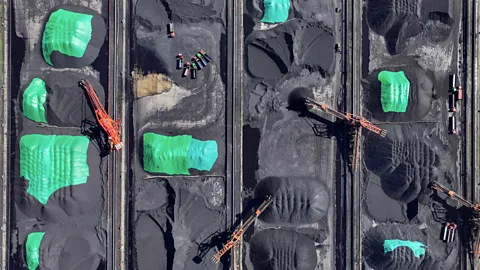
Getting them on board will not be easy and there are risks for states that put their head above the parapet. Susana Muhamad, Colombia’s environment minister, said her country’s credit rating was downgraded after it announced a halt in fossil fuel exploration a year prior to endorsing the treaty.
Green, who has provided unpaid informal advice to the initiative, is sceptical that large fossil fuel producers would sign up and says the reality of negotiating a treaty could involve uncomfortable trade-offs.
Harjeet Singh, global engagement director of the Fossil Fuel Treaty initiative, acknowledges that developing nations have lost trust in UN negotiations. “That makes it very challenging to convince these countries that we need to have another multilateral process to achieve justice,” says Singh.
He hopes to rebuild that trust through diverse civil society representation and engagement. The initiative has held consultations covering key subjects such as health, faith, gender and human rights to help shape a set of principles that underlies its work.
I knew the world leaders by themselves would not work on a treaty to stop coal, oil and gas – Omar Elmawi
The team behind the initiative is spread around the world, and it has a network of around 3,000 organisations at grassroots, national and international levels. Omar Elmawi, for example, has endorsed the treaty on behalf of the deCOALonize campaign he co-founded in Kenya and is now one of its African champions. He believes the initiative is thoughtful and strategic, and is pleased that it has so much support from the Global South. “I knew the world leaders by themselves would not work on a treaty to stop coal, oil and gas,” says Elmawi. “It was up to us to push them to see that this was inevitable.”
Singh says lessons have been learned from nuclear arms negotiations as well as other treaties on landmines, chemical weapons and ozone protection. “Like them, we need to build a movement and that movement building then helps us secure political buy-in.”

A treaty, if it goes ahead, would ultimately be negotiated by states, says Sawas. “But it’s a high-ambition coalition of governments that want to hear what civil society thinks is important.”
The number one barrier to getting states to sign up, says Sawas, is the financing needed for a just transition – a move away from fossil fuels supported by good-quality green jobs and without exploiting other resources in a way that harms human rights. “A lot of what I’m doing is looking at proposals and mechanisms that could be negotiated within a treaty initiative that would facilitate international cooperation for financing.”
That could, for example, involve slashing the debt mountain that undermines many countries’ abilities to address other crises. It might even mean tackling thorny issues like compensation and colonialism, which Singh says have been repeatedly raised during consultation.
Even if the most powerful fossil fuel-producing countries do not ascribe to a fossil fuel treaty, Von Bernstorff says it could still have huge symbolic value
Sawas adds that she is mapping existing initiatives to avoid duplicating or undermining other efforts, such as the going reform of international financial architecture led by Barbados’ prime minister Mia Mottley.
None of this means giving up on the Paris Agreement, stresses Sawas, who is actively involved in its just transition work programme and is attending talks in Baku.
“I think the old regime is still probably the most important one, but this brings a new dynamic,” says Von Bernstorff. “Not that it changes policies all over the world within five or six years, but it would put a lot of pressure on states in the Paris Agreement context.”
While the NPT did not prevent clandestine nuclear weapons programmes, experts say it did stop some countries from arming themselves that might otherwise have done so. It also put a legally binding obligation on states to negotiate nuclear disarmament, which its successor treaty effectively does.
It is too early to tell if the TPNW has been a success. But Snyder says it has given governments a tool to respond to nuclear threats “flying around” following Russia’s invasion of Ukraine. In 2022, parties to the treaty issued a declaration condemning all such threats and warning that they are a violation of international law.
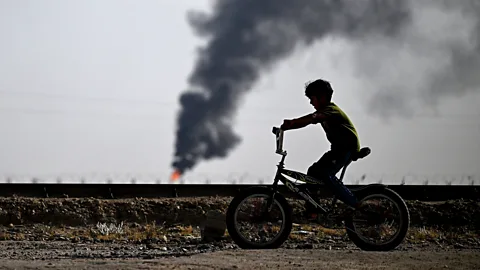
Snyder adds that the TPNW has helped build trust by setting frameworks for weapons inspections and transparency, and for the use of nuclear technology for non-military purposes. And it has helped put pressure on investors to exclude companies involved in the production of nuclear weapons, she says.
Even if the most powerful fossil-fuel-producing countries do not ascribe to a fossil fuel treaty, Von Bernstorff says it could still have huge symbolic value. “It sends a signal to the international community and also to financial actors – banks, multilateral financial institutions such as the World Bank and the IMF, regional development banks – that new explorations are a problem.”
In September, former UN general secretary Ban Ki-moon called on governments to negotiate a fossil fuel treaty, noting that “momentum made past treaties a reality – and we need it again”.
Singh suggests that that momentum is building. Even with just 14 countries publicly in support – and potentially more at the ongoing climate talks – the fossil fuel initiative is moving towards a more formal stage, with work planned on a legal roadmap and the start of multilateral talks.
Singh accepts that it is a hugely ambitious idea to tackle an extremely urgent problem. But the initiative has already helped develop a Global Registry of Fossil Fuels, collaborated on a toolkit for equitably phasing out fossil fuels and succeeded in getting the idea of a fossil fuel phase-out into the UN’s recent Pact for the Future.
“The world is much clearer now than ever about the cause of the climate crisis and the consequences and who should pay and what changes we need,” says Singh. “We feel that we have played some role, working with our allies, to help converge or coalesce all those demands. Yes, we have our eyes set on a treaty. But the journey is equally important.”

